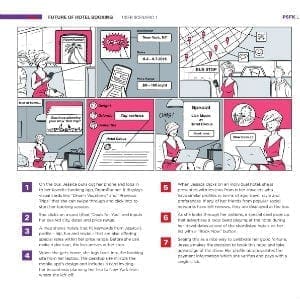 The GBTA Foundation, the education and research arm of the Global Business Travel Association (GBTA), has announced the results of its latest GBTA BTI™ Outlook – Western Europe report, a semi-annual analysis of the five most critical business travel markets in Europe: Germany, the UK, France, Italy, and Spain. These five markets serve as a good barometer of the health of the entire European business travel market. The report, sponsored by Visa Inc., includes the GBTA BTI™, a proprietary index of business travel spending that distills market performance over a period of time.
The GBTA Foundation, the education and research arm of the Global Business Travel Association (GBTA), has announced the results of its latest GBTA BTI™ Outlook – Western Europe report, a semi-annual analysis of the five most critical business travel markets in Europe: Germany, the UK, France, Italy, and Spain. These five markets serve as a good barometer of the health of the entire European business travel market. The report, sponsored by Visa Inc., includes the GBTA BTI™, a proprietary index of business travel spending that distills market performance over a period of time.
“Business travel in Western Europe is finally standing on solid ground,” said Catherine McGavock, Regional Director for Europe for GBTA. “Companies however are still showing a penchant toward saving for the future in case the economy backslides – that pessimism is slowly starting to abate, but optimism has not fully set in. Still, the stronger economy, lower energy prices and smart fiscal policies are pointing to a strong 2015 and 2016 for business travel throughout the region.”
Key highlights of the report include:
- Business travel spending in the five markets registered an estimated gain of 4.9 percent in 2014 to €146.1B ($186.3 billion USD). Spending is expected to increase by another 6 percent in 2015, to €154.79B ($197.47 billion USD) and 6.1 percent in 2016 reaching €164.15B ($209.41 billion USD), as economic momentum propels business travel spending forward.
- Germany and the UK led the way in business travel spending, but Spain’s business travel market also saw a notably strong business travel performance in 2014.
- The GBTA Foundation is seeing a shift toward domestic business travel demand driving growth more so than international outbound travel (IOB) as IOB spending will continue to remain challenged through 2015.
- Despite six months of improving debt and fiscal balances, an even more aggressive monetary stance and lower energy prices, the European economy continues to inch along. Eurozone GDP rose 0.4 percent in 2015 Q1, which while weaker than expected did mark the fifth consecutive quarter of positive growth.
- Much of the growth of the European economy is driven by consumption and capital spending.
- Sharply lower energy prices are providing another boost for Europe’s consumers. Unlike a tax refund, this income boost will accumulate slowly with each successive utility bill or petro fill-up, so it will take time for the benefit of lower oil prices to be fully realized.
“This year’s global BTI™ reveals promising news for business travel spending in Western Europe,” said Brian Triplett, Senior Vice President and Head of Commercial Products at Visa, Inc. “With five markets alone averaging nearly a 5 percent gain in 2014 and domestic travel expected to grow, the region continues to show signs of recovery.”
Country-level business travel outlooks
Germany
- Germany remains the brightest star in the European sky as strong economic growth and relatively competitive labour markets continue to propel business travel activity.
- Spending on business travel totaled €11.7 billion ($14.9 billion USD) in 2014 Q4, a gain of 7.5% from the same period in 2013 and overall spending on business travel in 2014 finished up 7.7% in Germany. GBTA expects business travel to grow at a very robust 10.1% in 2015 and by 9.4% in 2016.
- Spending on domestic business travel in Germany is expected to post its third consecutive year of accelerating growth in 2015 – surging 11.5% over last year. IOB growth on the other hand will moderate significantly in 2015 growing only 4.2%.
United Kingdom
- The UK had the second highest level of spending on business travel in Western Europe in 2014 — £27.5 billion ($43.5 billion USD).
- GBTA expects spending to increase 5.8% this year and 6.2% in 2016.
- Domestic business travel underperformed IOB travel in 2013, but bounced back in 2014. This momentum should continue with domestic spend expanding by 7.8% in 2015 while spending on IOB will continue to be challenged by the weaker global economy and is only expected to grow 2.1% in 2015.
France
- The French economy continues to have one leg in the northern tier and the other in the southern periphery. Still, business travel spending began to gain momentum in 2013 and continued to advance in 2014, albeit at a modest rate of 2%.
- GBTA expects growth will continue to be muted with total travel spending expanding 3% in 2015 and 4% the following year hitting €30.24B (38.6 billion USD).
- After slowing to 0.6% in 2014, domestic business travel spend is expected to grow 3.2% in 2015. IOB spending grew 4.6% in 2014, but that can be attributed to a cyclical snapback from a significant decline in 2013. IOB spending in 2015 is only expected to grow 2.5%.
Spain
- Spain has exhibited a remarkable economic turnaround driven by banking sector reforms and stabilization of public debt – and business travel has followed suit.
- Business travel spending advanced 6.8% in 2014 and GBTA expects it to accrue another 7.7% this year as total spending will reach €15.19B ($19.4 billion USD). Growth will moderate in 2016, but is still expected to rise 5.4%.
- The initial business travel recovery was fueled by IOB spending which grew 14.1% in 2014. Domestic business travel will now take over, however, and account for most of the growth in 2015 and 2016, advancing 8.6% and 5.6% respectively.
Italy
- Italy’s labour and product markets continue to lack the structural and political reforms necessary for getting the economy back on its feet.
- Poor economic conditions continue to take their toll on Italian business travel. While the direction of business travel spending is expected to be positive in 2015, it remains the slowest growing market in our forecast with projected growth of only 1%. Spending in 2016 is expected to be slightly higher advancing 1.8% to €24.94B ($31.8 billion USD)
The report is available exclusively to GBTA members by clicking here and non-members may purchase the report through the GBTA Foundation by emailing pyachnes@gbtafoundation.org.
GBTA will be hosting a webinar on June 24 at 9 am (ET) to further discuss this study and its findings. Learn more and register now.















